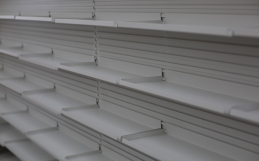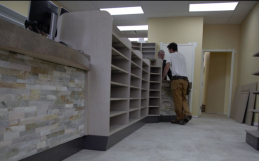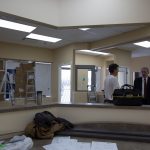So you’re about to sign an offer to lease. You have gone to check out the property, done a pre-lease inspection, and you’re reasonably confident that you are making a good choice for your new pharmacy location.
But you haven’t seen the lease yet… Your landlord promises they will send it along to you soon. Here’s the problem: an offer to lease is still a binding legal contract. It’s basically as good as a lease. So what questions should you be asking your landlord about the lease first?
The team at O’Connell Store Fixtures has brainstormed the top 5 questions that we’ve seen clients skip in the past. We hope you’ll find them a helpful resource!
How long will the lease run & will I be able to renew?
Some landlords will try to pin tenants down with longer leases. Conversely, in areas of high inflation, many landlords turn to shorter leases in the hopes of increasing the rent in future.
On average, a commercial lease will run from 3-10 years. If you’re a pharmacy owner, you will want a longer lease. Once you’ve established your pharmacy in a good location, you don’t want to move. It’s expensive to get started and build up a customer base that knows where to find you — and moving will undermine this effort.
You should prioritize places that offer long leases and give you first rights to the space, when your lease does expire. If you have a shorter-term lease, aim to negotiate a renewal formula with this provision.
What is the zoning for the property?
Zoning is particularly important for pharmacies. Retail pharmacies will need to be zoned for commercial, while pharmacies with doctor’s offices will require medical zoning. In the latter case, you may need to be zoned for both options.
It’s very important to check with your landlord about zoning laws — although you should not take their word for granted. Figure out how many parking spots are available and other zoning-related details. Making changes to zoning can be extremely costly and time-consuming, so you want to avoid it if possible.
What other businesses are located in the same complex?
After talking about zoning, this is a great follow-up question. Some areas will have zoning laws preventing pharmacies from being located within a certain distance of one another — or within the same complex.
We knew one pharmacy owner who leased property in a mall, only to discover that another pharmacy was granted exclusivity in the same mall. His lease prohibited him from opening his business there — and he’d already signed the document. Don’t let this happen to you. Ask about other businesses to avoid this situation or simply to reduce competition.
What forms of insurance coverage do you provide?
Insurance is an important topic that doesn’t receive enough airtime. A clear understanding of your insurance coverage will ensure any claims can be resolved smoothly and with minimal expense in the future.
Many landlords will carry their own insurance to protect them from general liabilities. For example, from a slip or a fall on the premises or from damages to the property itself.
As a pharmacy owner, you need to understand where the landlord’s responsibility ends and where yours begins. How should you be protecting yourself? We recommend talking to an insurance professional, who can review the landlord’s policies and identify the right fit for your situation.
What building services will I receive?
You should always ask about your building services, which can include electricity, HVAC, plumbing and (sometimes) cleaning. It may seem like common sense, but it’s always a good idea to dig deeper into what’s included in these services.
Our team has seen properties where ‘electricity’ and ‘plumbing’ meant a bundle of wires and an open pipe — no outlets, tap or sink. Don’t end up in this situation. If you get building services, make sure you understand exactly how much you will be paying for them too.
If you want assistance reviewing a lease, contact the team at O’Connell Store Fixtures in Ontario today.











